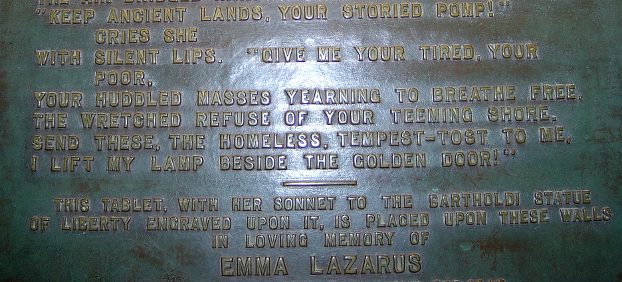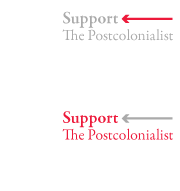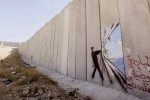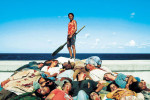
One of the greatest lies in the modern history of human migration is famously etched at the feet of Lady Liberty herself. The inscription boldly proclaims only a partial reality: “give me your tired, your poor, your huddled masses yearning to breathe free, The wretched refuse of your teeming shore. Send these, the homeless, tempest-tossed to me, I lift my lamp beside the golden door!”
In the 239-year history of the United States, the closest this would-be nation has come to accomplishing that largely unfulfilled promise of immigration at Ellis Island is letting in the multitudes of Europeans who have arrived on its shores in several waves since the earliest decades of its founding. Like the Statue of Liberty itself, a gift from one occidental community to another, most arrived in the United States with little more than the shirts on their backs as their sole worldly possession, but a path to possible acceptance and integration nevertheless.
Other would-be immigrants from elsewhere: the Orient, the non-western world, and nether regions have found the fabled “golden door” of America firmly shut to this promise.
Look no further for the evidence for this assertion than the uninformed, yet calculated statements of Donald Trump, the man who might easily become President of the United States were the presidential elections to be held today. In announcing his candidacy for the Republican nomination on June 16, 2015, Trump boldly declared to global media that “…when Mexico sends its people, they’re not sending their best…they’re sending people that have lots of problems, and they’re bringing those problems…”
Is that not, in fact, the promise enshrined at the feet of Lady Liberty? If Trump’s inarticulate and rather unfortunate assertions had any element of truth in them, why should Mexico not send their worst when America, arguably the most prosperous country yet in the history of human civilization, boldly promises to welcome “…poor huddled masses yearning to breathe free…” and make better citizens out of them? How does this country conceive of immigrants, and of the idea of freedom itself?
Opinion polls have since shown that Trump’s contemptuous attitude towards would-be immigrants is actually a pervasive sentiment across the contemporary American political landscape and within the cultural mainstream, one shared by many respondents in opinion polls around the country.
Trump’s claims were not only outrageous and divisive, they were also largely untrue. When most countries around the world today send their immigrants, Uncle Sam demands that only their brightest, their most talented and most diligent be allowed to remain.
Except for the State Department’s Refugee Admissions Program and the Diversity Immigrant Visa Lottery Program, current immigration laws of the United States demand that visa applicants and travelers demonstrate binding ties to their home countries such as property and family. It is expected that legal immigrants be educated with at least a high school diploma. Most of those who come through legal immigration channels, in fact, arrive with far more than that, comprising the upper echelon of society in their countries of origin.
Statistics from the United States Census Bureau and Data from the Department of Homeland Security show that the more substantive percentage of immigrants to America are legal immigrants and not illegal immigrants, as falsely claimed by Trump and believed by most of his sycophantic followers.
From Silicon Valley to Wall Street, Fortune 500 companies and other major economic stakeholders are staffed with some of the most educated and talented immigrants anywhere in the world.
The denial of entry to those most in need is not exclusive to the United States. Across the Atlantic, the ignominy of the current immigration discourse in Europe is sadly similar to that championed by the far-right in America.
This summer has seen perhaps the highest mass transnational migration of human beings the world has seen this century. From the war in Syria, the post-Gadhafi instability in Libya, and the continuing political and economic crises in several parts of Asia, central and North Africa, refugees have fled by boats and land routes in desperate bids to reach the relative peace and stability of European shores. The Syrian refugee crisis alone has generated over 4 million refugees in neighboring countries, with over half of the country’s population displaced.
Their mass arrival in many parts of Europe has been met with scorn akin to that faced by the most outcast of minority groups in Europe, such as the Romani, have faced in their history of transmigration across Europe.
From train stations to open fields, refugees and migrants[1] have been left to perish in the elements while European politicians dither in deciding what to do about and with them. Only recent coverage of children’s bodies washing up on European shores and deaths of dozens of migrants on a truck in Austria have spurred enough outcry to generate a more organized response from the EU.
Ironically, the greatest migrants the world has ever known, Europeans, now refuse to countenance those caught in similar predicaments and circumstances as thousands of their ancestors.
From the revered Pilgrim Fathers who arrived in the so-called “New World” to Boer Trekkers in the Veldts of Southern Africa, Syrian, Asian, and North African migrants are now undertaking the same perilous journeys for similar reasons –religious freedom, economic opportunity and safety.
Everywhere they arrived across “new worlds,” from the Americas, through Africa, Asia, Australia to New Zealand, European migrants supplanted autochthones, transforming the very definition of citizenship in the process: If you brave oceans and arrive anywhere in the world, if you fancy your destination, if you plant roots and make it your own, you may belong and claim a place…but only if you are European!
Look no further for affirmation of this perverse doctrine of citizenship than the fates of native communities– Aborigines, Maoris, and Zulus, and Native Americans in the Americas, as they continue to fight for recognition in their native lands.
Yet, whereas the exploits of the Pilgrim Fathers or the European explorers are lauded as brave, intrepid and adventurous in historical accounts, those of the current boat migrants and refugees who are in similar circumstances are described as desperate, and even foolish, for jumping on rickety boats and risking all with their families to disturb the peace, tranquility, and more critically the economies and narrowly defined national characters of Europe. The regard for the quality of an endeavor, and the humanization of those involved, still depends on the place of origin of the subjects in question.
The hypocrisy of “open borders” is unfathomable when you contrast how migrants have been treated in the summer of 2015 with discourses of global trade and economic exchange. “Globalization is inevitable!” “To trade…everyone!” “Open borders!” Weaker countries in the developing world are constantly harassed, bullied, humiliated and reprimanded by the World Trade Organization, the European Union and other hegemons of neoliberal reforms to open their borders to global trade, as long as their people always stay inside those borders.
Had Cecil the Lion’s murderer been denied a visa to enter Zimbabwe, you can bet your last dollar that the State Department would have been furious at the Zimbabwe government for being foolish and petulant over a “few travel bans” on Zimbabwean authorities for “human rights violations.”
As soon as conflicts erupt or are instigated through the interventions of European powers or their American counterparts in the postcolonies, however, those same advocates of the “free movement” of (European?) people and goods change their tone and cry out for their borders to be closed. “Keep the hordes at bay,” they weep, “lest Europe collapses under the weight of the problems they bring with them.”
Thus, we now have arrived at another shameful milestone in the history of the human community. Future conflicts will be deadlier precisely because belligerents will be reassured by the fact that the Europeans and Americans who have long dominated the economic and political landscape will stand by and do nothing as countries are ravaged and civilians displaced. They also know no one will directly intervene to stop them and, more disturbingly, they know Europeans will promptly shut their borders to innocents trying to flee the atrocities.
On Wednesday, September 2, 2015, body of a dead boy washed up on the beach of a popular tourist destination in Turkey. Only in death was the boy recognized as a human child in crisis. There cannot be a more symbolic reminder of the world’s failure to offer refuge to those who seek it, just as Pilgrim Fathers once sought refuge from their oppressors in Europe. The boy was found face down in the sand as if the innocence of his young life that was prematurely extinguished had proclaimed a big “shame on you Europe…I have left your world for a much better place!”
Footnotes
- There are complex distinctions to be made between “migrants” and “refugees.” The boat crisis and drownings began with migrants seeking better economic opportunities in southern Europe. They were mostly from Eritrea, some parts of east and central Africa and Libyans fleeing their crisis. Initially, most went to (or lost their lives trying to get to) Malta, Italy, Greece and Cyprus. The wave of people from Syria fall more easily under the category of refugees than the earlier wave because Syrians were fleeing the civil war. Libyans were, as well, and most of those who were initially clustered around Calais trying to reach England were economic migrants. Their situation has since been overtaken by the Syrian wave and deteriorating conditions in other countries, expanding the refugee numbers.






